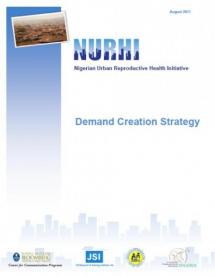NURHI Demand Creation Strategy
In Nigeria, investments on the demand side are desperately needed to publicly open the dialogue and establish the social acceptability of family planning; to increase (accurate) knowledge about methods and access points; to bring family planning discussion into everyday life, particularly among couples; and, ultimately to increase and sustain use. The Nigeria NURHI program used this strategy to develop consumer-first interventions for creating demand and sustaining use of contraceptives among marginalized urban populations. NURHI’s demand generation approach empowers consumers to adopt family planning by making it a part of everyday life. NURHI aims to achieve this goal by fostering dialogue around family planning; increasing understanding, appreciation, and social approval for family planning; reinforcing existing contraceptive use and reducing discontinuation; and improving knowledge and perceptions of family planning methods and the fertility cycle.
In 2012 a midterm evaluation (Measurement, Learning & Evaluation of the Urban Health Initiative: Nigeria 2012 Midterm Survey) showed considerable improvements in Family Planning knowledge and behavior across the four Nigerian cities. The evaluation showed increases in the knowledge of family planning methods from baseline to midterm across all cities for both men and women. More than 98 percent of men and women have correct knowledge (spontaneous or probed) of at least one family planning method at midterm. The largest increases were observed in Kaduna — a 23 percentage-point increase for women and a 19 percentage-point increase for men.
Source: Johns Hopkins University Center for Communication Programs
Date of Publication: March 25, 2019
SIMILIAR RESOURCES
Tools
Examples
- “Because my Husband and I Have Never Had a Baby Before…” Results and Lessons from Interventions with First-Time Parents in Madagascar, Mozambique, and Nigeria
- Factors Impacting Use of Health Services by First-time/Young parents: A Formative Research Toolkit
- Lessons Learned from an Integrated Approach for Reaching First-time Young Parents in Nigeria
- Evidence to Inform Social and Behavior Change for Family Planning in Francophone West Africa
- Generic Algorithm to Aid Action Planning at District and Regional Levels
- Community Communication MNCH e-Manual: Participatory Health Promotion Sessions
- Plan Stratégique National de Plaidoyer en matière de lutte contre le Paludisme (PSNPP) en Côte d'Ivoire 2018-2023
- Social Franchising: Improving Quality and Expanding Contraceptive Choice in the Private Sector
- How Businesses Can Invest in Women and Realize Returns
- Saving Women's Lives Through Family Planning
- Saving Women's Lives through Family Planning / Birth Spacing in Edo State: Role of Health Sector Policy Makers
- Saving Women's Lives through Family Planning / Birth Spacing in Edo State: Role of Legislators
- Words on Marble
- Program Briefs: Changing Attitudes to Shift Contraceptive Demand

